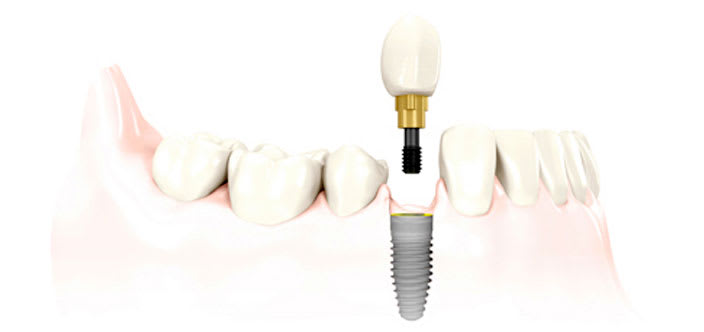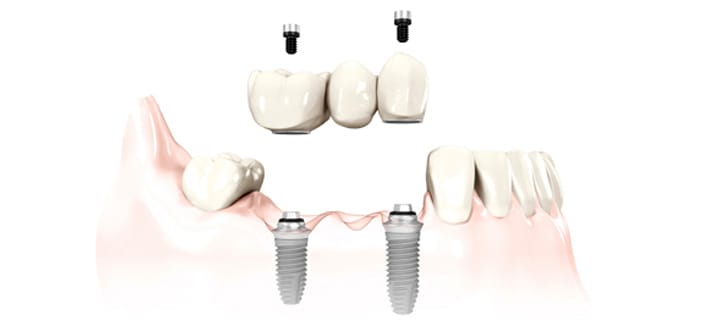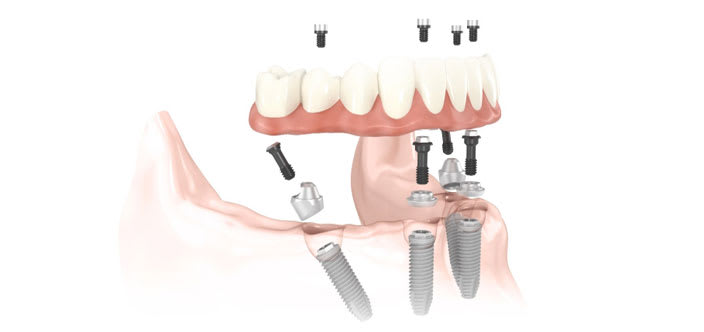
A Permanent Tooth Replacement Option
Missing teeth can cause us to feel self-conscious about our smile. For many people, dental implants can be an excellent way to replace missing teeth and rebuild that confidence.
Dental implants can be used to fill the gap left by one or multiple missing teeth. They can help prevent surrounding teeth from shifting, resolve bite issues or jaw joint pain, and help restore facial tissues and appearance.
Our dentists offer multiple dental implant options including single implants, multiple implants and implants supported dentures. The need for each dental implant option is determined on an individual, case-by-case basis.
Additionally, dental implants generally have a high success rate. They can be a long-lasting solution that can improve quality of life for people. With proper care and maintenance, dental implants can last a lifetime and provide a natural-looking and functioning tooth replacement.
The Dental Implant Process
Your dentist will use a dental implant (titanium screw) and a tooth replacement to fill the gap left by a missing tooth.
The dental implants process consists of surgically placing a tiny titanium screw into your jaw bone, below the gum tissue, to serve as the 'root' of the new tooth. As the tissue heals, the implant bonds with the bone and attaches to the gums. If you have insufficient jawbone to support an implant, you will require bone grafting before the dental implant surgery.
Once the healing is complete, generally three to six months post-surgery, you will return to our office to complete the process. At this final appointment, your dentist will attach a tooth replacement, such as a dental crown, bridge or denture, to create the look and function of a natural tooth.
Dental Implant FAQs
Read the answers to our most frequently asked questions about dental implants at Life Dental:
-
How long does a dental implant last?
With proper care, dental implants are designed to last a lifetime.
Maintaining a proper brushing and flossing routine at home, as well as attending regular hygiene cleanings and exams at your dental office, will help to ensure the longevity of your dental implants.
How long your dental implants last may also depend on other factors, including nutrition, genetics, or the development of any dental diseases.
-
How do I care for my dental implants?
Care for a dental implant in the same way as you would care for your natural teeth.
Visiting your dentist for regular hygiene appointments and maintaining a thorough brushing and flossing routine at home can help prevent decay or diseases from developing in the surrounding teeth and gums, which can negatively impact your dental implants.
-
Does getting a dental implant hurt?
Your dentist will administer anesthesia to help make you feel calm during the implant procedure.
Once the procedure is complete, there is not usually much discomfort.
Typically, patients can comfortably overcome the discomfort using over-the-counter medication.
During the healing process, a soft diet is usually recommended in order to avoid pain after the implant procedure.
-
How long does the dental implant process take?
The entire dental implant process usually can take anywhere from three to nine months to complete, depending on your overall oral health and how long it takes to fully heal between stages.
Your dentist will be able to provide you with a more specific timeline based on your specific case.
-
Will my insurance cover dental implants?
This is a challenging question to answer. Every policy is a little different. Some insurance companies will cover the full cost of dental implants, whereas some will only pay for a portion of the cost, and others will not cover any part of the dental implant procedure.
To determine whether your dental implant treatment will be covered by your policy, check with your insurance provider.
Our Dental Implant Options
At Life Dental, we offer multiple long-term solutions for missing teeth to help provide a strong foundation for a new permanent tooth.

Single Implants
A single dental implant, capped with a dental crown, can replace a single missing tooth. Your single implant can fit almost seamlessly in with your natural teeth, and you may even find that you forget that it's there.

Multiple Implants
If you have two or more missing teeth in a row, multiple implants may be an effective solution for restoring your oral health. With this technique, we can use two implants to secure three or more artificial teeth.

Implant Supported Dentures
A fixed, implant-supported denture is a permanent way to replace a full upper and/or lower jaw of teeth. This can be a good option for people who need new teeth for the first time or need to replace dentures.
